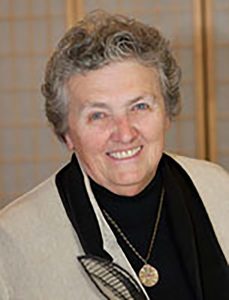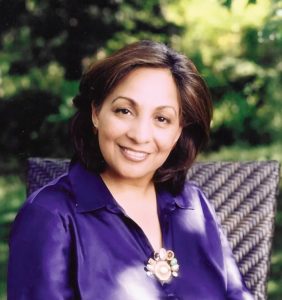Sr. Joan Chittister, O.S.B., is Catholic. Daisy Khan is Muslim.
When they met at Chautauqua Institution, they had an immediate connection — both are advocates for the rights of religious women around the world.
At 2 p.m. Friday in the Hall of Philosophy, Khan and Chittister will participate in a conversation-style lecture titled “Women in Religion: Acknowledging, Claiming, Living Leadership.”

After their first meeting, Khan invited Chittister to speak at the launch of her organization: Women’s Islamic Initiative in Spirituality and Equality (WISE).
At first, no one in the room knew what an elderly Catholic lady was doing at their launch, or even who Chittister was. But Khan said once Chittister began to speak to the women, something changed. Loud and confident, she spoke of the responsibility and meaning behind “being a rebel.” Khan said the whole room went into “thunderous applause.”
“I brought a Catholic perspective into a Muslim meeting, and found that we share more in common than we have that divides us, meaning women in every major tradition are struggling to be seen as full human beings. None of the male imams, bishops, cardinals [or] pastors will admit that,” Chittister said. “I saw Daisy [doing] … what Catholic women have been doing for centuries, and that is studying both the theology, the philosophy and the sociology of women’s roles and finding them lacking.”
As part of this week’s theme “Moral Leadership in Action,” the women will each provide a unique perspective on female activism within religious communities in the U.S., and discuss how to create positive change.
“It’s going to be a conversation; it’s not canned,” Chittister said. “If it’s a good conversation, it will develop between us in an honest and open way so that the audience itself can realize that its own questions are legitimate and exciting ones.”

Creating positive change, Khan said, is an essential part of moral leadership.
“I think that if your religion is being marred by a group of people that have a political entity and they’re hijacking your religion, then yes, you have a moral authority to stand up,” Khan said. “Each one of us who is a creation of God has to stand up and speak out against injustices, especially if they’re done in the name of God.”
When Khan emigrated from India to the U.S. at 16, she changed her first name from Farhat to Daisy in an attempt to assimilate into American society.
Khan was a modern Muslim woman, and said she grew up feeling empowered by all the men and women in her family. It wasn’t until her marriage to Imam Feisal Abdul Rauf that being an activist was even a thought.
But circumstance eventually caused Khan to re-examine her culture and faith. When a scheduling conflict prompted her to give a lecture in her husband’s place, she found herself being asked questions about all the injustices Muslim women around the world face. One question from a “little old lady” struck her: “My dear, I believe everything you’re saying. But what are you doing about it?”
Khan calls this experience “life altering,” because it made her realize that as a modern woman living in the U.S., she has power that other Muslim women around the world do not. She then felt compelled to start WISE to give a voice to Muslim women of the world and strengthen them together as a group. Today she serves as the organization’s executive director, and is a prominent commentator on topics of Muslim women’s rights as well as Islamophobia and violent extremism.
“[The experience] made me feel responsible for what it means to be a Muslim woman, because I realized that Muslim women are increasingly being perceived through a political lens, and that we are much more than just that,” Khan said. “That’s when I realized I had to construct religiously grounded arguments for the humane and honorable empowerment of women, and to lift the truth of Islam. That’s when I was forced to delve deeper into my faith, into the theology, into the verses of the Quran, so that I could inspire not only myself, but inspire other women to create positive change.”
Khan said she knew her arguments needed to be religiously focused because that was the only way to reach her audience. Chittister also believes equality can be established by a better interpretation of religious texts.
“You have to remember that every major document in the world proclaims equality … and then they tell you where it doesn’t count,” Chittister said. “When you unmask the distance from the word to the reality, you discover that everybody is separated by words. So in this meeting of Muslim women [launching WISE] it was perfectly clear to me that their interpretation of the Quran was very much broader and clearly closer to what the Quran would identify as a fullness of truth.”
Chittister said Christians deal with the same issues. She said even though it’s clear Jesus never attempted to tell women what they could or couldn’t do, and that he also broke every single cultural barrier in Israel, somehow it’s 2,000 years later and women are still dealing with the same issues. She took the disputed topic that is religious gender equality, and said its argument should be simple.
“It’s not a difficult or complex topic. … We say God made us all, God made us equal, God made men and women the same,” Chittister said. “We say we want equality and justice, we say that we’re working toward it, but women are the least educated, hungriest, poorest, most unpaid, most rejected, completely invisible species on the globe.”
Chittister has been working to change those problems for more than 35 years, offering her insight across lecture platforms, through her regular column in the National Catholic Reporter and as the author of more than 50 books.
She is a Benedictine Sister and serves as the co-chair of the Global Peace Initiative of Women, a partner organization of the United Nations that supports women peace builders across the world. She is also a former president of the Leadership Conference of Women Religious.
Khan was inspired by Chittister at Chautauqua years ago, and believes in the importance of support from women across various faiths.
“People just [get] so much comfort from knowing that other women of other faiths have struggled too, and that women’s struggle is one and our history is one and our solutions are going to come from learning from one another,” Khan said. “Sr. Joan was there by my side when I was an infant [new to women’s activism], so I look up to her as my teacher. I’m a little humbled that I’m sharing this podium with her.”




